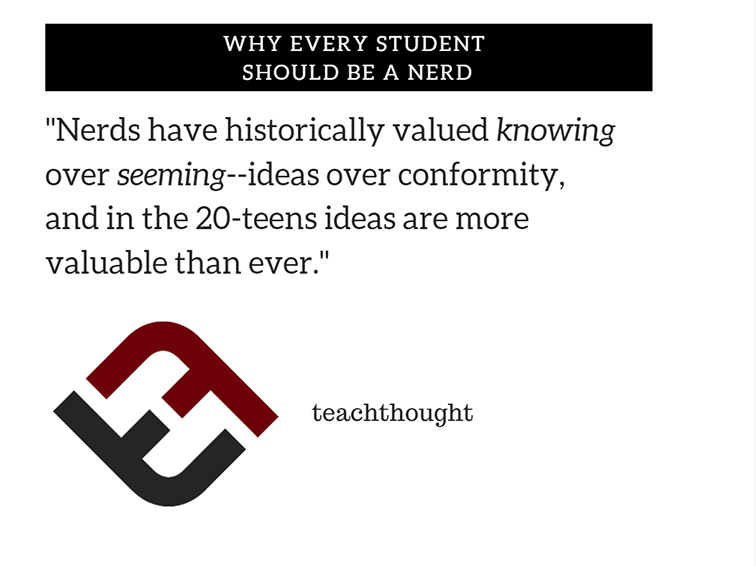
Why Every Student Should Be A Nerd
By Terry Heick
As a kid, I never thought of myself as a ‘nerd.’
For one, ‘nerd’ isn’t something you strived to be in the 1980s and 1990s. (Remember the movie “Revenge of the Nerds?)
I did what was (then) normal stuff–played sports, rode my bike, skateboarded, climbed trees, and tried like crazy to avoid doing chores or getting grounded. I didn’t enjoy school, and did everything I could to keep from reading most of the time. I did play video games, but while I never managed to be ‘cool’, that was as dangerously close as I got to the social stigma of being branded a nerd. (Probably.)
But times have changed. A technology-obsessed culture has reinvigorated terms like ‘nerd’ and ‘geek’, to several effects. Tech is often complex, and is also mainstream. This is a convenient ‘in’ for nerds, growing the population of voluntary participants in these longstanding sociological genres.
Put briefly, nerds have historically valued knowing over seeming–ideas over conformity, and in the 20-teens, ideas are more valuable than ever. Because of technology and that platforms it has enabled, the economy is increasingly characterized–to a degree–by people who do things rather than corporations that make things. Consumerism hasn’t died and manufacturing hasn’t dried up, but the web has democratized participation in society–as long as that society is digital.
ABC, NBC, HBO, Nickelodeon, and other media creators and providers are no longer the destination platforms they once were. Today, it’s Netflix and Hulu and twitch and perhaps more than any other platform, YouTube–and the latter two are dominated by young people making, singing, playing, destroying, analyzing, dramatizing, and otherwise doing things.
Stream yourself playing video games as a job? Try explaining that one to your parents in the 1980s.
Be an Instagram celebrity? Maybe just do yoga poses and become a master of camera angles and filters and, with an economy of language, become a millionaire.
Film yourself opening packages of high-tech hardware–tablets and smartphones. Build a following. Provide content people want or need and grow. This, roughly put, is an entirely viable business model in the 20-teens.
And is what I do. I help educators think about learning. That’s pretty nerdy. I spend a large part of my time on social media but not in a cool or personal way–I don’t have the time to do that because I have too much else to do. I email. I listen to podcasts and read and read some more.
I talk about ideas, often on a computer, with other people who have ideas too. That’s what nerds do.1
Today, nerds have all of the potential. Following and adhering and conforming are currencies less valuable in comparison.
Nerds read. A lot. Often books, but also blogs and social streams. So do a lot of people, I guess, but they don’t just read, they read with a purpose.
Nerds also gather–reddit, for example, is full of them. They categorize themselves into smaller communities called subreddits, and moderate themselves out of love for that topic the said subbredit is built around.
Nerds do things because they’re fascinated by them.
Nerds seek to counter the mainstream not out of a sense of rebellion, but because the mainstream is where good ideas go to die.
Nerds design things. Bridges, avionics, poems, apps, wearable technology, media channels, electric cars, and all the other ideas the cool kids end up adopting.
Nerds love concepts. They wear t-shirts with ideas on them.
Nerds like games. They gather as adults and play them together–and not just athletic games, but board games, video games.
Nerds don’t necessarily love school either, nor do they have to get ‘straight A’s.’ That’s not a nerd, that’s a very successful (and probably compliant) student. A nerd can get straight A’s, but they do so because being successful academically is something they want to do.
More than anything else, nerds risk ridicule in pursuit of realization–of ideas, dreams, and more. As a society we are less and less tolerant of bullying, name-calling, and other forms of public shaming, which means that calling someone a ‘nerd’ today is less acceptable than in the past–which is good.
But it doesn’t make the following any less true: Now more than ever, if you’ve got an idea and have the courage to find your own way–and fail a lot along the way–there are the means to do something great with that idea.
Whatever we want to call them, that’s the kind of student education would do well to seek to produce.
Why Every Student Should Be A Nerd